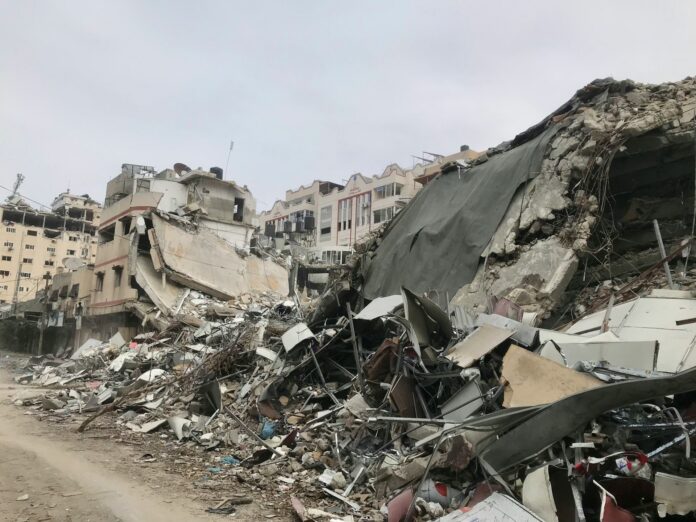Syrian defence ministry reports fatalities; monitor claims 12 pro-Iran militia members dead after strike on copper plant.
Syria‘s defence ministry announced that several people died in alleged Israeli airstrikes near Aleppo early Monday. Reports indicate the attack targeted a copper plant in Hayyan, a town north of Aleppo. The incident occurred around 12:20 a.m. and led to significant damage, with large flames seen emanating from the site.
“The Israeli enemy launched an air attack from the southeast of Aleppo, targeting some positions,” the Syrian defence ministry stated through state-run media. “The aggression led to a number of martyrs and some material losses.” The ministry did not specify the exact number of casualties.
The Syrian Observatory for Human Rights, a UK-based opposition war monitor, reported that at least 12 fighters from pro-Iran militias were killed in the attack. The Observatory, which claims to have extensive sources within Syria, noted that the town of Hayyan is controlled by pro-Iranian groups, including both Syrians and foreigners. The organization has faced criticism for allegedly inflating regime losses in the past.
Israel has not commented on the strike. Historically, Israel has conducted hundreds of strikes inside Syria since the onset of the civil war, primarily to prevent the transfer of weapons to Hezbollah or to curb Iranian military presence near Israel’s borders. Aleppo, located far from Israel, has been targeted in the past, but such attacks are less common.
The most recent alleged Israeli strike before this incident occurred on May 29, targeting the coastal city of Baniyas. That strike resulted in the death of a young girl and three Hezbollah members, according to the Syrian Observatory for Human Rights. The girl was reportedly killed by shrapnel from a Syrian missile intercepting an Israeli missile.
Israeli airstrikes have intensified since the Israel-Hamas war in Gaza began on October 7, following a large-scale cross-border attack by Hamas that resulted in the deaths of 1,200 people in Israel. Israel responded with a military offensive aimed at dismantling Hamas and rescuing 252 hostages taken to Gaza during the attack.
Hezbollah has engaged in near-daily exchanges of fire with the Israeli army since the day after the Hamas attack. Hezbollah, an Iranian-backed militant group, has targeted Israeli communities and military positions along the border, claiming these actions are in support of Gaza amidst the ongoing conflict.
Analysis:
The recent airstrike near Aleppo underscores the ongoing tensions and the complex web of alliances and enmities in the Middle East. Israel’s alleged targeting of pro-Iranian positions in Syria highlights the strategic imperative of curbing Iran’s influence and military capabilities in the region. This incident adds another layer to the already volatile dynamics between Israel, Iran, and their respective proxies.
From a political standpoint, these strikes serve multiple purposes for Israel. They aim to disrupt the supply lines and operational capabilities of groups like Hezbollah, which pose a direct threat to Israel. The strikes also send a clear message to Iran and its allies about the limits of their operational reach and the consequences of attempting to establish a foothold near Israeli borders.
Sociologically, the repeated airstrikes contribute to the ongoing humanitarian crisis in Syria. Civilian casualties and infrastructure damage exacerbate the suffering of the Syrian population, which has endured years of conflict. The targeting of military positions often leads to collateral damage, further complicating efforts to stabilize the region and rebuild war-torn areas.
Economically, these airstrikes impact the already fragile Syrian economy. The destruction of facilities such as the copper plant in Hayyan not only disrupts local economies but also deprives communities of critical infrastructure. This economic destabilization can lead to increased poverty and displacement, fueling further unrest and migration.
Locally, the strike in Aleppo is significant due to the city’s historical and strategic importance. Aleppo has been a focal point of the Syrian conflict, and its control is crucial for both the Syrian regime and opposition forces. The presence of pro-Iranian militias in the region reflects the broader geopolitical struggle, with Iran seeking to solidify its influence through its proxies.
From a gender and minority perspective, the ongoing conflict and airstrikes disproportionately affect women and minority groups. These populations often face higher risks during conflicts, including displacement, violence, and loss of livelihoods. Efforts to address their specific needs are crucial in any humanitarian response.
In conclusion, the alleged Israeli airstrike near Aleppo highlights the persistent and multifaceted conflicts in the Middle East. The geopolitical, sociological, and economic ramifications of such strikes contribute to the complexity of achieving peace and stability in the region. As Israel continues its efforts to counter Iranian influence, the impact on the ground remains profound and far-reaching
